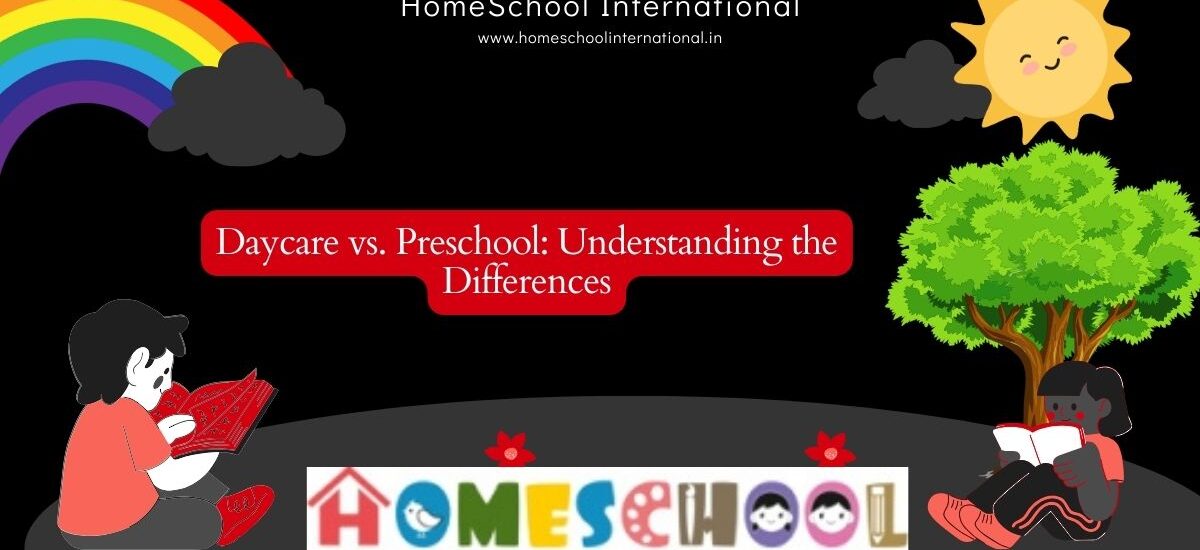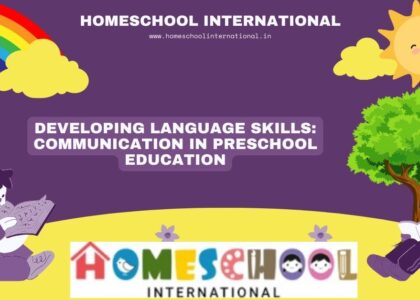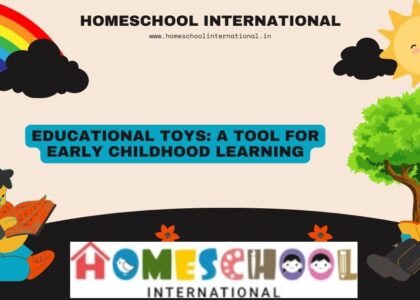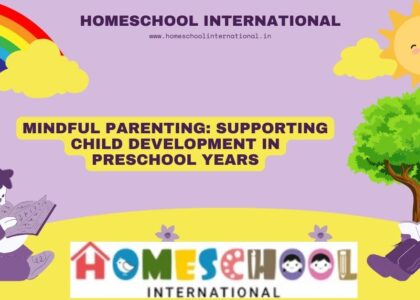Daycare vs. Preschool: Understanding the Differences- In the realm of early childhood education, parents are often faced with the decision of choosing between daycare and preschool for their young children. Understanding the nuances and differences between these two options is crucial for making an informed choice that aligns with both the child’s developmental needs and the family’s circumstances. Welcome to our exploration of “Daycare vs. Preschool: Understanding the Differences.” At Homeschool International, we recognize the significance of this decision in shaping a child’s educational journey. In this blog post, we delve into the distinctions between daycare and preschool, providing insights to help parents navigate this important decision with confidence. Join us as we unravel the differences and implications of daycare versus preschool, empowering you to make the best choice for your child’s early education.
Also Check: Nurturing Curiosity: Science and Exploration in Preschools
Defining Daycare: What to Expect
Daycare facilities serve as essential support systems for working parents by offering childcare services during working hours. Understanding the nature of daycare and its core functions is crucial in discerning its role in a child’s early upbringing.
The Purpose of Daycare: Daycare centers primarily focus on providing a safe and nurturing environment for children while their parents are at work. These facilities cater to children from infancy to preschool age, offering basic care, meals, and structured activities to support their development.
Age Range and Services Offered: Daycare centers typically accommodate children ranging from infants to around five years old. They provide essential services such as feeding, diaper changing, and nap times, ensuring the physical well-being of children throughout the day.
Emphasis on Socialization: One of the key aspects of daycare is its role in fostering socialization among young children. Through interactions with peers and caregivers, children learn valuable social skills such as sharing, cooperation, and empathy, laying the foundation for future social development.
Nurturing Environment: Daycare environments prioritize creating a nurturing atmosphere where children feel secure and cared for in the absence of their parents. Trained caregivers and staff members offer emotional support and guidance, promoting a sense of comfort and belonging among children.
By structuring the content with clear headings and incorporating relevant keywords, this section not only enhances readability but also improves search engine visibility for the topic of daycare versus preschool.
Understanding Preschool: Beyond Basic Care
Preschool programs play a distinct role in early childhood education, focusing on providing structured learning experiences to prepare children for formal schooling. Delving into the essence of preschool education unveils its unique characteristics and benefits for young learners.
Educational Objectives: Unlike daycare, preschool programs emphasize early education and school readiness. They aim to introduce children to fundamental academic concepts and foster cognitive, social, and emotional development through age-appropriate activities and curriculum.
Structured Curriculum: Preschools typically follow a structured curriculum tailored to the developmental needs of young children. This curriculum often includes activities designed to promote pre-math and literacy skills, as well as opportunities for creative expression, problem-solving, and critical thinking.
Age Group and Enrollment: Preschools cater to children in the years leading up to kindergarten, typically around ages three to five. Enrollment in preschool programs is voluntary and often requires parents to consider factors such as their child’s readiness for structured learning and their educational goals.
Preparing for Formal Schooling: One of the primary goals of preschool education is to prepare children for the transition to formal schooling. By introducing them to routines, academic concepts, and social interactions in a structured setting, preschools lay the foundation for future academic success and lifelong learning.
By structuring the content with clear headings and incorporating relevant keywords, this section not only enhances readability but also improves search engine visibility for the topic of daycare versus preschool.
Also Check: The Role of Technology in Early Childhood Education
Key Differences: Curriculum and Learning Goals
Understanding the disparities between daycare and preschool necessitates a closer examination of their respective curricula and learning objectives. By dissecting these components, parents can make informed decisions regarding their child’s early education journey.
Daycare Curriculum: Emphasis on Care and Supervision: Daycare centers prioritize providing a safe and nurturing environment for children, focusing on basic care and supervision rather than structured academic instruction. While some daycare facilities may incorporate educational elements into their daily routines, the primary goal remains ensuring the well-being of the children in their care.
Preschool Curriculum: Early Education and School Readiness: In contrast, preschools are designed to offer structured learning experiences aimed at preparing children for formal schooling. Preschool curriculum often includes activities that target cognitive development, language acquisition, pre-math and literacy skills, socialization, and emotional regulation. These activities are carefully planned to align with age-appropriate developmental milestones and educational standards.
Learning Goals in Daycare Settings: The primary learning goals in daycare settings revolve around promoting socialization, independence, and emotional development. While children engage in play-based activities and interactions with peers and caregivers, the focus is on building social skills, fostering a sense of security, and developing basic self-help skills.
Learning Goals in Preschool Settings: In preschool settings, the learning goals are more academically oriented, with an emphasis on preparing children for formal schooling. Preschools aim to cultivate foundational skills in literacy, numeracy, critical thinking, and problem-solving, laying the groundwork for future academic success. Additionally, preschools prioritize social development, helping children navigate social interactions, resolve conflicts, and collaborate with others effectively.
By structuring the content with clear headings and incorporating relevant keywords, this section not only enhances readability but also improves search engine visibility for the topic of daycare versus preschool.
Considerations for Parents: Making the Right Choice
Navigating the decision between daycare and preschool requires careful consideration of various factors that impact a child’s early education journey. By weighing these considerations, parents can make informed choices that align with their child’s needs, family dynamics, and educational goals.
Child’s Age and Developmental Stage: The decision to enroll a child in daycare or preschool often hinges on their age and developmental readiness. While daycare may be suitable for younger children who require primarily care and supervision, preschool may be more beneficial for older children who are ready for structured learning experiences and socialization.
Parental Work Schedules and Family Circumstances: Parental work schedules and family circumstances play a significant role in determining the most suitable childcare option. For parents who work full-time or irregular hours, daycare may offer the flexibility and extended hours needed to accommodate their schedules. On the other hand, preschool may be preferable for families seeking part-time or full-day educational programs.
Educational Goals and Philosophies: Understanding personal educational goals and philosophies can help parents align their childcare choices with their values and aspirations for their child’s future. Parents should consider whether they prioritize early academic preparation, socialization opportunities, or a balance of both when selecting between daycare and preschool options.
Quality of Care and Education: Evaluating the quality of care and education provided by daycare and preschool facilities is essential in making an informed decision. Parents should research and visit potential childcare centers, inquire about accreditation, licensing, and curriculum standards, and observe the interactions between caregivers and children to ensure a nurturing and stimulating environment.
Financial Considerations: Financial considerations, including tuition costs, enrollment fees, and additional expenses, can influence the decision-making process. While preschool programs may offer more structured educational experiences, they often come with higher tuition fees compared to daycare options. Parents should assess their budget and weigh the costs against the benefits of each childcare option.
Child’s Individual Needs and Preferences: Ultimately, the decision between daycare and preschool should prioritize the child’s individual needs, preferences, and temperament. Parents should consider factors such as their child’s temperament, socialization skills, readiness for structured learning, and comfort level with separation when determining the most suitable childcare arrangement.
By structuring the content with clear headings and incorporating relevant keywords, this section not only enhances readability but also improves search engine visibility for the topic of daycare versus preschool.
Also Check: Childhood Adventures: Outdoor Activities in Preschools
Conclusion: Daycare vs. Preschool- Understanding the Differences
As parents navigate the decision between daycare and preschool, it’s essential to prioritize the child’s holistic development and educational needs. By considering factors such as the child’s age, developmental stage, family circumstances, and educational goals, parents can make informed choices that set the foundation for their child’s future success.
The Importance of Early Education: Both daycare and preschool play valuable roles in a child’s early education journey, offering unique opportunities for socialization, learning, and growth. Whether parents opt for daycare to meet immediate childcare needs or preschool to provide structured educational experiences, the key is to prioritize quality, safety, and alignment with the child’s developmental needs.
Empowering Parents to Choose: At Homeschool International, we understand the importance of empowering parents to make choices that best suit their child’s needs and family circumstances. We encourage parents to research, visit, and ask questions about potential daycare and preschool options, ensuring that they feel confident and informed in their decision-making process.
Continuing the Journey of Learning: As children embark on their early education journey, whether in daycare or preschool, the journey of learning and discovery continues. By fostering a supportive and nurturing environment at home and in the chosen childcare setting, parents can reinforce the importance of education, curiosity, and lifelong learning in their child’s life.
We extend our gratitude to all parents, caregivers, and educators who prioritize children’s early education and invest in their future success. Together, we can create a brighter future for the next generation, one filled with opportunities for growth, exploration, and academic achievement.











